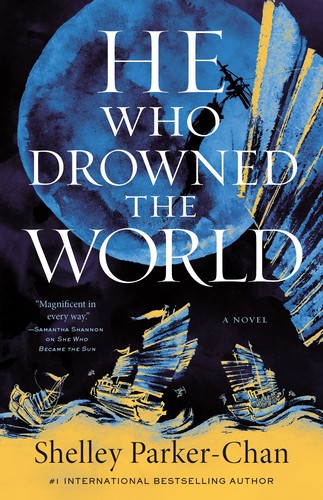A couple of small things first:
Ouyang's rejection of Zhu after the scene with Fang makes so much sense. It was especially heartbreaking because I loved the two of them working together after being enemies for so long, but it also made logical sense that Ouyang's unchecked misogyny is not something that would so easily be resolved.
I worried a bit about the presence of Ma in most of the book. She shows up for a heist in the opening scene, but other than some brief moments she is mostly not around. I think it makes some logical plot sense (she's running things while Zhu is off stealing salt or fighting battles) but she comes back for the big emotional finale. Having Ma there at the end as the compassionate heart to Wang really makes the end of the book. It feels like Ma is always the one that pulls Zhu back from the brink of ruthless pragmatism, and having her there in the finale where Zhu and her ghost sword give Wang mercy adds a lot of weight to that moment. I still wish there was more of her around, but I am glad for what we got.
I had mixed feelings about Wang's point of view. It was certainly tough to read somebody so hell-bent on self-destruction, personally. In some ways, it's a similar bent as Ouyang, revenge against the people who have wronged him, but for Wang it's emotional revenge on the world at large, but more specifically Esen. I think what ended up working for me by the end was the parallels between Wang and Madame Zhang, where they both had larger goals that were interrupted by unexpected tenderness and truly caring for others that they thought they were using (the third prince, General Zhang), and that they both achieved what they wanted but only found ashes.
Larger things:
The emotional hinge of this book for me was the scene with Chen, Xu, and Zhu after the boat battle where Chen is threatening to maim and kill Xu unless Zhu surrenders. This is definitely the moment where I feel like Zhu falters the most; she is desperate to try to come up with some other plan, she doesn't want to surrender and she also doesn't want her best friend to be hurt.
In the end, the resolution is that Xu kills himself to end the standoff. In some ways this felt like an easy and unsatisfying answer to an impossible problem where Zhu is able to avoid making a hard decision. However, the more I thought about this, the resolution where we learn that Xu has done this (and many things) as a willing sacrifice for Zhu and the world she is trying to create; this to me makes all the difference emotionally. It's not Zhu choosing to sacrifice Xu for victory, but rather Xu's own choice. It's still heartbreaking, but it turns a moment of cold pragmatism into a moment of grief, and in retrospect I feel like this moment sets the tone for the rest of the novel.
Even with that tone set, the moment where Ma tells Wang that she is pregnant fully brought me back to the moments with the third prince. In the moment, the pregnancy reveal feels like a lie to cover up the murder of Jiang. It gave me some dread that this was a parallel of the previous fake pregnancy, of potentially the now-empress Zhang using the same medicine that killed the third prince on Ma to try to kill Ma's child (and instead kill Ma). That Ma, like Xu, would then sacrifice herself for Zhu and Zhu would pay the price of losing yet another person that she loved. FOOF. I think tonally this would have made for a very different ending, and yet I felt like it was still very possible here in the moment.
Finally, I love also that the four main characters all come together for the finale scene where Zhu takes Ouyang's ghost sword, Ma reveals herself as Zhu's wife to Wang, and Zhu gives Wang mercy if he gives up his mandate. It's just such a powerful scene to have all of these four characters who are all connected come together for that moment of mercy. Chef's kiss.

